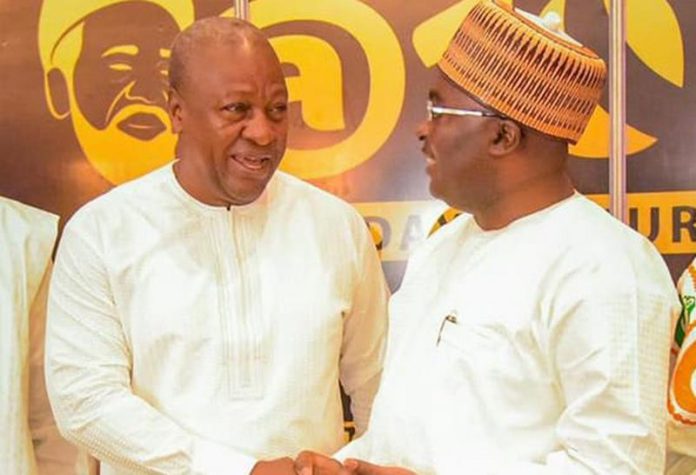As Ghana heads toward another election cycle, the country’s future rests on the decisions of its political leaders and their ability to deliver on the bold promises contained in their manifestos. Each election, presidential candidates from the major political parties — primarily the National Democratic Congress (NDC) and the New Patriotic Party (NPP) — put forth grand visions of economic transformation and social progress.
However, a crucial question remains: How well do these political ambitions align with the business realities that drive Ghana’s economy and, ultimately, improve the quality of life for ordinary Ghanaians?
For business leaders, particularly CEOs of Corporate Ghana, the stakes are high. With Ghana’s economy facing challenges like inflation, high public debt, unemployment, and infrastructural deficits, it is essential for CEOs to actively engage political leaders on their manifesto promises to ensure that these political ambitions are not only realistic but also economically sound. Ghanaian CEOs must play a central role in these discussions, as the policies that emerge from election promises will shape the economic environment within which businesses must operate, grow, and contribute to national development.
This is why the Chief Executives (CEO) Network Ghana and its partners Deloitte, PricewaterhouseCoopers, University of Ghana, UPSA Law and Multimedia Group are organizing the 1st Ghana CEO-Presidential Manifesto Gala Dinner — to hold presidential candidates accountable to their manifesto promises. The event will serve as a platform for direct engagement between the business community and political leaders, ensuring that these promises align with the realities of doing business in Ghana, and contribute to the nation’s long-term prosperity.
The Disconnect Between Political Ambition and Business Realities
In the heat of election campaigns, political rhetoric often strays into idealism. Candidates present manifestos brimming with ambitious projects, social interventions, and economic reforms designed to sway voters. While many of these proposals appear impressive on paper, they often fall short when subjected to the realities of budget constraints, global market conditions, and the domestic business environment. For instance, ambitious infrastructure projects may be proposed without clear funding strategies, or employment policies may overlook the capacity of the private sector to absorb labour.
This disconnect can lead to policy misalignment, where well-intentioned government programs fail to translate into sustainable business growth or meaningful improvements in the quality of life for citizens. CEOs in Ghana, therefore, have a responsibility to bridge this gap by engaging political leaders on the practicality of their policies and ensuring that manifesto promises are grounded in the realities of doing business in Ghana.
Why Ghanaian CEOs Must Engage Presidential Candidates
1. Shaping Economic Policy
Political leaders may have the power to make laws, but businesses drive economic growth. CEOs are in a unique position to provide informed perspectives on the challenges and opportunities within their industries, offering insights that political candidates may not fully grasp. By engaging candidates, CEOs can help shape realistic economic policies that foster an enabling environment for businesses to thrive, create jobs, and stimulate economic growth.
For example, tax policies, regulatory frameworks, and trade agreements outlined in political manifestos can have far-reaching consequences for both local and multinational businesses operating in Ghana. CEOs must ensure that these policies promote *competitiveness, **innovation, and *sustainability, rather than creating unintended obstacles.
2. Ensuring Business-Friendly Reforms
While political candidates often focus on social interventions and public sector reforms, it is critical that their manifestos also address the specific needs of the *private sector. CEOs must engage candidates on the business realities of running companies in Ghana, from access to finance and infrastructure challenges to talent shortages and the cost of doing business.
The private sector is the engine of Ghana’s economy, contributing significantly to GDP, employment, and tax revenue. For CEOs, it is essential to ensure that candidates’ policies take into account the operational realities that businesses face. A well-informed government, aware of the challenges that businesses contend with, is more likely to implement reforms that promote economic stability and long-term growth.
3. Driving Accountability and Policy Continuity
Manifesto promises often reflect the aspirations of political leaders but may lack specificity when it comes to implementation and *accountability. CEOs, as key stakeholders in the national economy, must hold political leaders accountable for delivering on their promises. This requires establishing a *framework for dialogue with candidates both before and after elections, ensuring that there is follow-through on policies that are beneficial to the business environment and the broader economy.
Moreover, business leaders should advocate for policy continuity across administrations. Inconsistent policies and frequent regulatory changes can create uncertainty, hindering long-term planning and investment. By engaging candidates early, CEOs can advocate for a stable and predictable policy environment that fosters investor confidence.
4. Aligning Business Objectives with National Development Goals
The quality of life of Ghanaians is intricately tied to the *health of the economy. When businesses grow, they create jobs, improve livelihoods, and contribute to national development. However, political leaders may not always prioritize policies that align with the needs of the private sector. CEOs must ensure that their voices are heard, advocating for policies that strike a balance between *economic growth and social development.
For instance, political candidates often propose policies aimed at reducing unemployment or boosting local industries. CEOs must challenge these policies to ensure they are feasible and sustainable, particularly in the context of Ghana’s global economic participation. Policies that ignore market forces or impose burdens on businesses could inadvertently undermine economic growth and job creation.
Enhancing the Quality of Life Through Policy and Business Collaboration
Ultimately, the purpose of government policies and business operations should be to improve the quality of life for Ghanaians. While political manifestos often emphasize poverty alleviation, healthcare, and education, these social outcomes are deeply connected to economic performance. CEOs must work hand in hand with political leaders to ensure that manifesto promises are backed by sound economic policies that create an environment where businesses can thrive, thereby generating wealth and social benefits for all Ghanaians.
This partnership between political ambition and business reality is key to achieving inclusive growth and sustainable development. Through direct engagement with political leaders, CEOs can help craft a national agenda that not only delivers on the promises made to voters but also fosters a vibrant economy that benefits everyone.
Conclusion
As Ghana looks to the future, CEOs must seize the opportunity to engage with presidential candidates from the NDC, NPP, and other political parties. By participating in discussions around manifesto promises and business realities, they can ensure that political ambitions are tempered with economic pragmatism. In doing so, they will help create an environment where businesses can grow, citizens can prosper, and the promises made to the electorate are fulfilled. A prosperous Ghana is only possible when political leaders and business executives work together to align their visions for the future.
This is the reason why the Chief Executives (CEO) Network Ghana and its partners are organizing the 1st Ghana CEO-Presidential Manifesto Gala Dinner — to hold presidential candidates accountable to their manifesto promises and ensure a sustainable future for Ghana.
*****
Articles from the staples of Chief Ernest De-Graft Egyir.
Ernest De-Graft Egyir is a Consultant and Advisor to CEOs and the Founding Chief Executive Officer of Chief Executives (CEO) Network Ghana Ltd, a specialized CEO-consulting firm. He is also the driving force behind The Ghana CEO Summit, the premier business leadership conference for CEOs, and The Ghana CEO Network, an exclusive business club for top executives in Ghana. Additionally, He champions The Ghana CEO Excellence Award, which celebrates outstanding CEOs and businesses for their excellence, success, innovation, leadership, and economic contributions across various sectors.



